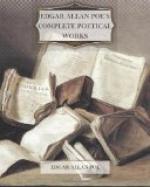The outcome of this exhaustive and unprofitable labor was the fascinating story of “The Gold Bug,” a story in which the discovery of hidden treasure is brought about by the unriddling of an intricate cipher.
The year 1841 may be deemed the brightest of Poe’s checkered career. On every side acknowledged to be a new and brilliant literary light, chief editor of a powerful magazine, admired, feared, and envied, with a reputation already spreading rapidly in Europe as well as in his native continent, the poet might well have hoped for prosperity and happiness. But dark cankers were gnawing his heart. His pecuniary position was still embarrassing. His writings, which were the result of slow and careful labor, were poorly paid, and his remuneration as joint editor of ‘Graham’s’ was small. He was not permitted to have undivided control, and but a slight share of the profits of the magazine he had rendered world-famous, whilst a fearful domestic calamity wrecked all his hopes, and caused him to resort to that refuge of the broken-hearted—to that drink which finally destroyed his prospects and his life.
Edgar Poe’s own account of this terrible malady and its cause was made towards the end of his career. Its truth has never been disproved, and in its most important points it has been thoroughly substantiated. To a correspondent he writes in January 1848:
“You say, ’Can you hint to me what was “that terrible evil” which caused the “irregularities” so profoundly lamented?’ Yes, I can do more than hint. This evil was the greatest which can befall a man. Six years ago, a wife whom I loved as no man ever loved before, ruptured a blood-vessel in singing. Her life was despaired of. I took leave of her forever, and underwent all the agonies of her death. She recovered partially, and I again hoped. At the end of a year, the vessel broke again. I went through precisely the same scene.... Then again—again— and even once again at varying intervals. Each time I felt all the agonies of her death—and at each accession of the disorder I loved her more dearly and clung to her life with more desperate pertinacity. But I am constitutionally sensitive—nervous in a very unusual degree. I became insane, with long intervals of horrible sanity. During these fits of absolute unconsciousness, I drank—God only knows how often or how much. As a matter of course, my enemies referred the insanity to the drink rather than the drink to the insanity. I had, indeed, nearly abandoned all hope of a permanent cure, when I found one in the death of my wife. This I can and do endure as becomes a man. It was the horrible never-ending oscillation between hope and despair which I could not longer have endured, without total loss of reason.”
The poet at this period was residing in a small but elegant little home, superintended by his ever-faithful guardian, his wife’s mother—his own




